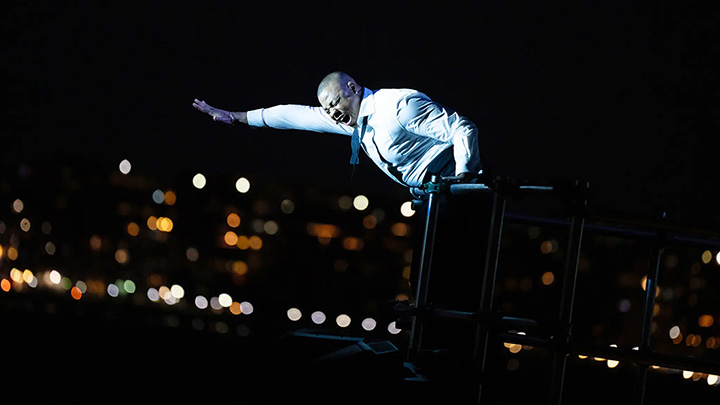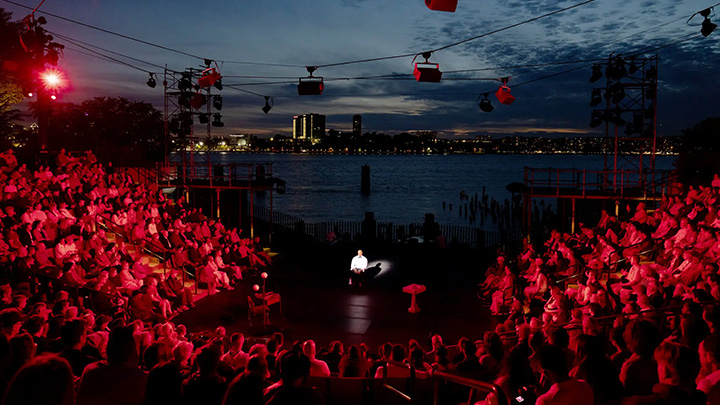
Singer, actor, activist, first Black pupil at Rutgers school, Columbia-educated lawyer, NFL participant, Communist, enemy of the CIA, and good friend of the working class, bass-baritone Paul Robeson stands in a category by himself. If anybody genuinely-earned the designation of Renaissance man or the operatic-historical therapy, it was Robeson. This weekend at Little Island, Davóne Tines—a Renaissance man himself— introduced Robeson again to life in wealthy, suggestive splashes of shade in a recital-cum-opera filled with his personal preparations of works related to Robeson with stellar path from co-conceiver Zach Winokur.
The efficiency opened with Tines doing an impression of Robeson’s return to Carnegie Corridor in 1958; this was the primary time he was allowed to carry out in public after enduring years of scrutiny, censorship, and harassment by the state for his political beliefs. A celebration boat drifted by behind the musicians. Tines, who has one of the crucial versatile and multifaceted sounds of any artist working at present, sounded clear and powerful, however it wasn’t totally clear the place this was going.
After the third track, nevertheless, Robeson started in earnest. Like Robeson did at Carnegie Corridor, Tines supplied the ultimate monologue from Othello. Othello, a personality who works tirelessly to forge his personal story within the face of the merciless, insidious narratives that encompass him, asks to be remembered precisely, for his terrible deeds but additionally for his triumphs, his the Aristocracy, and his dignity. His ultimate tragedy is ceding that story to others. As Tines completed the monologue, the present shifted to offer us a premonition of Robeson’s suicide try—or, because the singers son believes, an try on his life by CIA operatives— in Moscow in 1961. A razorblade slashed Robeson’s wrist. From there we noticed Robeson haunted by his personal voice, in a deft little bit of sound design from Kai Harada, which emanated from a radio and from all 4 corners of the stage. Robeson’s voice was out of the blue now not his personal. The up to date mad scene may appear gratuitous to some, however to me it cemented the power of Tines and Winokur’s venture; they may have meant to shock us, however this scene was so laden with meanings, the traumas endured by Robeson so layered, that it nonetheless managed to really feel complicated.

Musicians John Bitoy and Khari Lucas, who up up to now had supplied sterling accompaniment hadn’t gotten to flex their muscular tissues totally, started to shift the sound-world from the usual piano-voice into a brand new area of electronics, guitar, and drums, with pre-recorded tracks becoming a member of Tines in key moments. It was slick and richly textured, including texture and dimension that solely grew after the present.
Tines right here was mesmerizing, singing a rendition of “No person Is aware of the Hassle I’ve Seen” that firmly cleared it from all cobwebs of cliché. Quickly after, he launched within the gospel commonplace, “Fly Away.” Breaking free from his Robeson impression, Tines’s voice climbed larger and better in a cry of rage and longing, as he climbed a balcony and stretched his arm out over the Hudson. It was searing, visceral, and sung with impeccable management.
Whereas the central scene was virtually overwhelming in its depth and energy, and it’s clear that Robeson had lots to say—about singing as a struggle for justice, about what it means to have a voice— for essentially the most half Tines allowed the musical alternatives and his personal vocal prowess to talk loudest.
This light-handed contact with exposition confirmed each a deep respect for Tines’s historic interlocutor and a belief within the intelligence of his viewers. As an alternative of being instructed about Robeson, we noticed one thing of Robeson. From “That is the Hammer,” we see Robeson as a champion of the working man. From “The Home I Reside In” we get a glimpse into the singer’s tortured relationship with America: each his anger and betrayal on the injustice at its core and the love for the individuals who constructed it on their backs. From “The Volga Boat Track” we perceive a bit about his curiosity in Russia, to which he retreated at numerous occasions.
And in flip, we noticed one thing of Tines, who got here throughout not solely as a singer on the high of the vocal recreation, however a superb researcher and reader of literature, drama, and historical past, and an artist with actual imaginative and prescient.
Close to the tip of the live performance, Tines sang a model of “This Little Mild of Mine” that took the Sunday-school traditional and solid it into one thing blistering and white-hot; it traveled from the deepest bass to the heights of glory, as Tines’s higher vary almost to burst into flames. It was so spectacular that tears sprang into my eyes from the pure thrill of the singing. There was a mid-song ovation from the assembled crowd, and a small smile crept over Tines’s face. He had us, and he knew it.
All the pieces we’d simply heard, Tines instructed us, was one thing Paul Robeson sang or stated, or one thing that was stated about him. The night time ended with a brand new model of “Outdated Man River” a beloved track from a racist musical that Robeson—based on Tines—struggled all through his profession to adapt into one thing true, even liberatory. Tines described his frustrations with the track, after which, in his most shifting tribute to Robeson but, Tines supplied his personal adaptation (“there’s that outdated man I *don’t* wish to be”), one the place that river symbolizes the relentless tide of violence, censorship, and resignation, in opposition to which the singer stood agency as a boulder, unmoved by the eddies.
Pictures: Julieta Cervantes


